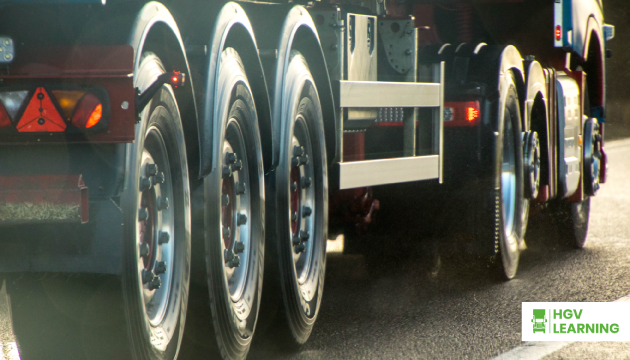Introduction
Here at HGV Learning we know how important it is that you operate heavy goods vehicles (HGVs) safely, ensuring that they are roadworthy and safe to drive is a top priority. One of the most critical aspects of ensuring the safety of your HGV is carrying out an MOT check.
In this comprehensive guide, we will explore the ins and outs of the HGV MOT check process, providing you with all the information you need to ensure your HGV is compliant with the legal requirements.
What is an HGV MOT Check?
An HGV MOT check is a legal requirement for all commercial vehicles that weigh over 3.5 tonnes (vehicles eligible to be driven under a Cat C licence). The MOT test helps ensure that your HGV is safe to drive on the road and meets the minimum safety standards. The test is conducted annually by a certified MOT test centre.
During the HGV MOT check, a qualified inspector will inspect the vehicle’s essential components, such as brakes, steering, suspension, lights, and exhaust emissions. The inspector will also check the overall condition of the vehicle and ensure that it meets the minimum safety standards.
Why is an HGV MOT Check Important?
The importance of conducting an HGV MOT check cannot be overstated. Ensuring that your vehicle meets the minimum safety standards is crucial for preventing accidents, injuries, and fatalities on the road. Moreover, non-compliance with the MOT regulations can result in hefty fines and even the loss of your operator’s license.
Regular maintenance and MOT checks can save you a lot of money in the long run. If you identify any issues during the MOT check, you can resolve these before they turn into costly repairs.
Regular maintenance and MOT checks can also improve the performance and efficiency of your HGV. This often results in lower fuel consumption and longer lifespan.
What are the Requirements for an HGV MOT Check?
Before conducting an HGV MOT check, you need to ensure that your vehicle meets the following requirements:
- You must register your HGV with the DVSA (Driver and Vehicle Standards Agency) and have a valid V5C logbook.
- Your HGV must be roadworthy and safe to drive on the road. The vehicle must meet the minimum safety standards set by the DVSA (Driver and Vehicle Standards Agency).
- Your HGV must not emit excessive smoke or pollutants. It must comply with the emissions standards set by the DVSA.
- Your HGV must be at least three years old to require an MOT test.
- You must conduct an MOT test annually to keep your HGV legal and safe to drive.
What Happens During an HGV MOT Check?
During an HGV MOT check, a certified inspector will carry out a comprehensive inspection of your vehicle. The inspector will check the following components:
- Brakes – The inspector will check the condition and performance of your HGV’s brakes, including the brake pads, discs, drums, and hydraulic system.
- Steering – The inspector will check the condition and operation of your HGV’s steering system, including the steering wheel, steering column, and steering box.
- Suspension – The inspector will check the condition and operation of your HGV’s suspension system, including the shock absorbers, springs, and ball joints.
- Lights – The inspector will check the condition and operation of your HGV’s lighting system, including headlights, indicators, brake lights, and hazard lights.
- Exhaust Emissions – The inspector will check the level of pollutants emitted by your HGV’s exhaust system. This is to make sure that they comply with the minimum standards set by the DVSA.
- Bodywork – The inspector will check the condition of your HGV’s bodywork, including the chassis, cab, and external fittings.
- Tyres – The inspector will check the condition and tread depth of your HGV’s tyres. This ensures that they meet the minimum requirements set by the DVSA.
- Windscreen – The inspector will check the condition of your HGV’s windscreen. This includes finding any chips, cracks or damage that may affect visibility.
After conducting the inspection, the inspector will provide you with a report that details any issues or defects found during the check. If any issues are identified, you will need to get them fixed before you can legally drive your HGV on the road.
How to Prepare for an HGV MOT Check?
Preparing for an HGV MOT check requires attention to detail and a proactive approach. To ensure that your vehicle is in good condition and meets the minimum safety standards, here are some tips to help you prepare for an MOT check:
- Conduct Regular Maintenance Checks – Regular maintenance checks can help you identify any issues with your HGV before they become major problems. Ensure that you conduct regular checks on your vehicle’s brakes, suspension, tyres, and lights.
- Keep Your HGV Clean – A clean HGV is not only visually appealing but also helps to identify any issues or defects during the inspection. Ensure that your vehicle is clean and free from any debris.
- Ensure that All Documentation is Up-to-Date – You need to ensure that all documentation, including your HGV’s registration, V5C logbook, and insurance, are up-to-date and valid.
- Check Your Emissions – Ensure that your HGV’s emissions are within the minimum standards set by the DVSA. If necessary, get an emissions assessment before before the MOT test.
- Use a Certified MOT Test Centre – Ensure that you use a certified MOT test centre to conduct the HGV MOT check. An official test centre will provide you with a valid MOT certificate that has the recognition of the DVSA.
- Conduct a Pre-MOT Check – Before taking your HGV for an MOT test, conduct a pre-MOT check to identify any potential issues or defects that may arise during the test. This check can help you address any problems before the test and avoid any unnecessary expenses.
- Address Any Issues Promptly – After the identification of any issues during the MOT check, it is important to address them promptly. You must rectify any problems that affect the safety of your HGV before you can legally drive your vehicle on the road.






